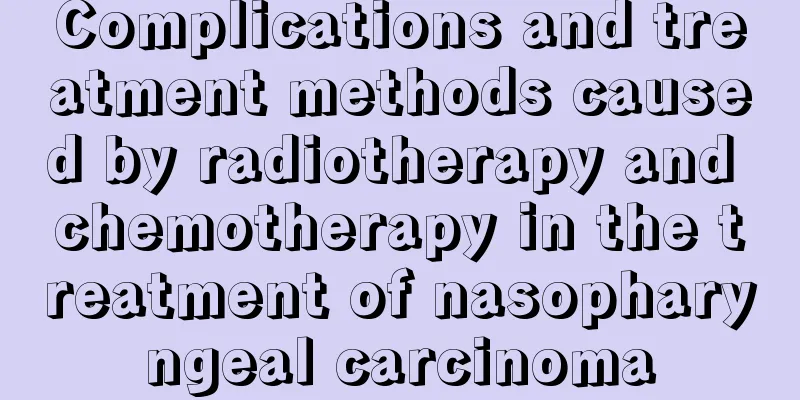Complications and treatment methods caused by radiotherapy and chemotherapy in the treatment of nasopharyngeal carcinoma

|
The treatment of nasopharyngeal carcinoma often adopts a combination of radiotherapy and chemotherapy, which of course will cause a series of complications. For some reactions, reasonable methods should be taken in time to deal with them. (1) Nose rupture and bleeding: The cause is that after radiotherapy, the tumor regresses rapidly, the tumor tissue necrotizes and falls off, and the surrounding tissue cannot be effectively repaired, resulting in blood vessel rupture. In addition, after radiotherapy, the nasopharyngeal mucosa is dry, and the local blood vessels are hardened and brittle. When the tumor necrotizes and forms ulcers, combined with infection, the ulcers deepen, eventually causing blood vessel rupture and massive bleeding. (2) Radiation encephalopathy: It is a late complication after radiotherapy for nasopharyngeal carcinoma, manifested by headache, polyphasia, olfactory hallucination, limb weakness, and unsteady gait. It is caused by temporal lobe necrosis after radiotherapy and is related to factors such as the total radiotherapy dose, fractionated dose, and the range of irradiated brain tissue. (3) Sinusitis: Before radiotherapy for nasopharyngeal carcinoma, the tumor blocks the posterior nostril and even the nasal cavity, so the incidence of sinusitis is high. (4) Radiation stomatitis: 1 to 2 weeks after radiotherapy, the oral mucosa will develop redness, swelling, pain, and ulceration. As the radiation dose continues to accumulate, the oral mucosa may develop the following: thin white films of varying sizes, mucosal erosion, and increased pain. Nebulizer inhalation can be performed 2 to 3 times to reduce inflammation, swelling, and infection. If the pain is unbearable, you can rinse your mouth with a solution of 10 to 15 ml of 2% lidocaine hydrochloride added to 250 ml of normal saline before eating. (5) Parotid gland injury: The parotid gland may have an acute reaction within a few hours after the first fraction of radiotherapy, which is manifested as temporary tenderness and occasional obvious swelling. The long-term consequences are unclear and there is no need to worry. Mild analgesics (such as acetaminophen) can be taken to relieve the pain. |
<<: The best treatment for nasopharyngeal carcinoma
>>: Pancreatic cancer patients can choose CyberKnife treatment according to their condition
Recommend
What is the recovery method for cerebral thrombosis?
Cerebral thrombosis is a common cerebrovascular d...
What contains the most collagen protein
When it comes to collagen, most people are famili...
Does a broken wrist require surgery?
Many people have experienced bone injuries, espec...
What's wrong with the hollow toenail?
The hollow toenails are often caused by onychomyc...
Four commonly used diagnostic methods for ovarian cancer
About 90% to 95% of ovarian cancers are primary o...
Analyze the clinical symptoms of malignant melanoma from different angles
Malignant melanoma is a relatively rare malignant...
A healthy person should meet the following 10 criteria
Everyone wants to have a healthy body. In the pas...
Is thick blood hereditary?
More and more middle-aged friends often have some...
How to diagnose stomach cancer
How is stomach cancer diagnosed? Gastric cancer i...
Rational Emotive Therapy
Emotional fluctuations are a phenomenon that ever...
Pay attention to the early symptoms of brain cancer and control the spread of the disease
The incidence of brain cancer has been very high ...
Will wearing hip-lifting pants help?
Nowadays, many people have sagging and loose butt...
What is the reason for blood coming out of the anus when defecating
If there is blood in the stool, the biggest cause...
How can we prevent gastric cancer in our daily life
The incidence of gastric cancer in my country is ...
The best Chinese patent medicine for qi stagnation and blood stasis
Generally speaking, blood stasis can be treated n...









